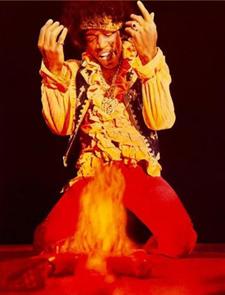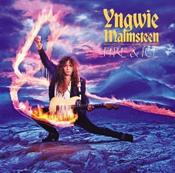His eyes seem so glazed As he flies on the wings of a dream, Now he knows his father betrayed Now his wings turn to ashes to ashes his grave. Fly, on your way, like an eagle, Fly as high as the sun…
Lyricist Bruce Dickenson refers to the fall of a Greek mythological hero in Iron Maiden’s "Flight of Icarus." But he may as well be speaking of the tragic figure's modern counterpart, the Guitar Hero, for he has been dethroned, emasculated, and replaced with a sissified shell of his former glory.
 Like Icarus, the rock Guitar Hero of the 60's, 70's and 80's flirted with fire, flew a little too high, and got burnt in the process. But in his quest for greatness our hero also transcended the ordinary, and encountered the mysterious, the supernatural, the divine, returning to the mundane world with powers previously unrealized. And true to the archetype, his sacrifice resulted in treasure for us regular folk – in this case, musical treasure. Or at least for those who appreciate the sublime strains a master can evoke from a Fender Stratocaster that happens to be on fire.
Like Icarus, the rock Guitar Hero of the 60's, 70's and 80's flirted with fire, flew a little too high, and got burnt in the process. But in his quest for greatness our hero also transcended the ordinary, and encountered the mysterious, the supernatural, the divine, returning to the mundane world with powers previously unrealized. And true to the archetype, his sacrifice resulted in treasure for us regular folk – in this case, musical treasure. Or at least for those who appreciate the sublime strains a master can evoke from a Fender Stratocaster that happens to be on fire.
Born in the shadow of the baby boom generation, I was too young to have ever witnessed the wizardry of Jimi Hendrix live in concert, but I spent a good portion of my teenage years making up for it. Missing out on the counterculture scene may have been a good thing, though. By the time I started attending rock concerts, some of the more lurid aspects associated with the genre had waned in favor of actual musical talent. And there was no shortage of it. Guitarists the likes of Jeff Beck and Eric Clapton finally came into their own, charting new and improved territory for the electric guitar and popular music.
By the 80's, the spectacle of the rock show had reached its climax as the machismo-driven genre of heavy metal dominated the charts. The Guitar Hero had evolved into something much larger than life.
 Virtuosos Ritchie Blackmore, Yngwie Malsteem and Michael Schenker had synthesized musical elements from the Baroque, Classical and Romantic periods into their melodic compositions while continuing to push the limits of technical proficiency. Lyrics touched on subjects of mythical proportions, but it wasn't the vocalist the throngs of young men came to see.
Virtuosos Ritchie Blackmore, Yngwie Malsteem and Michael Schenker had synthesized musical elements from the Baroque, Classical and Romantic periods into their melodic compositions while continuing to push the limits of technical proficiency. Lyrics touched on subjects of mythical proportions, but it wasn't the vocalist the throngs of young men came to see.
On stage, the Guitar Hero was a god; a veritable master over thousands of entranced, idolizing multitudes. He was perhaps as close to the idea of Nietzsche's Übermensch, or Superman, that popular music ever afforded the common youth. For unlike the Britney Spears' of the world, he was more than an object of base desire. He was an object of aspiration. Through his individual achievement and sacrifice, he had earned a special place above and apart from the rest of the band…the herd. And he was very, very good at what he did. Suddenly, it was cool to aspire to greatness. It was cool to excel. And above all, it was cool to be your own person.
Some debate arose concerning the use of the term "neoclassical" to describe the subgenre made popular by the above virtuosos. It is, after all, a bit of a misnomer. Rock guitar was never a traditional incarnation of classical music, nor did it claim to be. Its practitioner's simply incorporated classical structures into a popular genre, but with a focus on speed, presentation, and technical proficiency. Regardless, their perfectionism inspired a generation of young people to embrace excellence in their own lives as well.
 I was one of them. Growing up on a healthy regimen of testosterone-driven metal drove me to acquire some degree of proficiency on guitar myself, and along the way, a BA in Music and some might even argue a successful music career. Where, I wonder, would I be had Britney, Paris, or any other in a litany of talentless nothings been my role model? Could meeting today's musical "talent" engender feelings of story telling to younger generations or make one head to the nearest shower to wash the filth off? Not that I ever particularly needed (or wanted) a path laid out for me by some cultural icon. I believe that job lies within the sacred realm of the family and individual. But the regretful truth is we all reflect, at least to some degree, the culture we grow up in.
I was one of them. Growing up on a healthy regimen of testosterone-driven metal drove me to acquire some degree of proficiency on guitar myself, and along the way, a BA in Music and some might even argue a successful music career. Where, I wonder, would I be had Britney, Paris, or any other in a litany of talentless nothings been my role model? Could meeting today's musical "talent" engender feelings of story telling to younger generations or make one head to the nearest shower to wash the filth off? Not that I ever particularly needed (or wanted) a path laid out for me by some cultural icon. I believe that job lies within the sacred realm of the family and individual. But the regretful truth is we all reflect, at least to some degree, the culture we grow up in.
The 80's had seen rock's pinnacle of guitar prowess and showmanship via melodic metal, but something foul had been stirring in the country's northwest corner. The slovenly, stoop-shouldered beast wore a moth-eaten flannel shirt, torn jeans, and smelled really, really bad. It couldn't play guitar or sing in tune, but it had the full backing of cooperate media. In fact, MTV played Nirvana's "Smells Like Teen Spirit" so frequently, the beast itself couldn't believe its undeserved rise to fame.
The fall came swiftly in the early 90's as the musical genius of the Guitar Hero was usurped by the vilest sound ever to rise from the rain-drenched gutters of the Emerald City. That "Seattle sound" was called grunge, originating from the slang for filthy, dirty, and disgusting. A fitting term, I think, for a "musical" genre that shunned manly brilliance in favor of grime and mediocrity. Seattle was the Liverpool of the 90's, but unlike Liverpool, it smelled like teen spirit, or what I like to think of as a teen runaway living on University Avenue sharing needles and going weeks without a shower.
 I know. I was there the day the Guitar Hero got buried behind a wall of sludge so thick his Marshall stack was barely audible even cranked up to 10.
I know. I was there the day the Guitar Hero got buried behind a wall of sludge so thick his Marshall stack was barely audible even cranked up to 10.
What a difference a decade makes.
Much to my glee, the grunge movement didn't last long. No sooner had its disease infected the collective conscience of America's youth then it was replaced with the degeneracy of gangsta rap.
But the damage was already done.
Never mind the overwhelming popularity of melodic metal and the millions upon millions it raked in for the music industry. The corporate media had made up it's mind the accomplished, masculine Guitar Hero would forever be replaced by hum-drum, wimpy effeminates on its mainstream TV and radio waves.
I'm convinced no amount of rain in Seattle will ever wash away the muck of grunge and the musical devastation it left in its wake. But don't bother bringing any of this up to today's teenager. He's more likely to equate guitar playing with a video game aptly named, Guitar Hero, than with a real human being playing a real instrument.
South Park recently did a satirical piece on this disturbing phenomenon. Yes, I watch those crazy little animatrons so you don't have to. In the episode, characters Stan and Kyle spend every waking moment playing with their video game controllers, which resemble guitars in shape, but not much more. Obsessed with wowing the crowd inside the machine, the boys work to make every nuance and hand movement perfect, but to what end? Stan's dad plugs his real guitar into a real amp and plays a lively rendition of Kansas' "Carry On My Wayward Son," but the boys are disinterested to the point of disgust. One leaves the episode wondering how far the boys could have gone had they only channeled that energy into a real instrument, or for that matter, a real anything.
From demigod to mortal trash, our Hero finally met his demise behind the screen of a video game. Or at least that's what our state-sponsored media would have today's youth believe. The truth is, what's made widely available to the masses through controlled channels does not necessarily reflect reality – quite the opposite, actually.
I want to hear the Guitar Hero of the new century. I know he's out there, but where is he hiding, or rather, where has the music industry hidden him away?
 In Greek mythos, the hero is associated with male energies. If I were blind to this fact, I might dismiss the notion the corporate medias' attempt to render this archetype impotent is an attack on all men everywhere. But archetypal theory isn't completely lost on me, and I doubt it's lost on the social engineers who decide what the masses should listen to, admire, and emulate.
In Greek mythos, the hero is associated with male energies. If I were blind to this fact, I might dismiss the notion the corporate medias' attempt to render this archetype impotent is an attack on all men everywhere. But archetypal theory isn't completely lost on me, and I doubt it's lost on the social engineers who decide what the masses should listen to, admire, and emulate.
You certainly wouldn't know it by tuning in your local Top 40 station, but the Guitar Hero has, in fact, survived the attempts to completely stamp him out from mass consciousness. He records, tours internationally, and is aired via independent media. Just don't expect to see him on MTV anytime soon.
December 22, 2007



